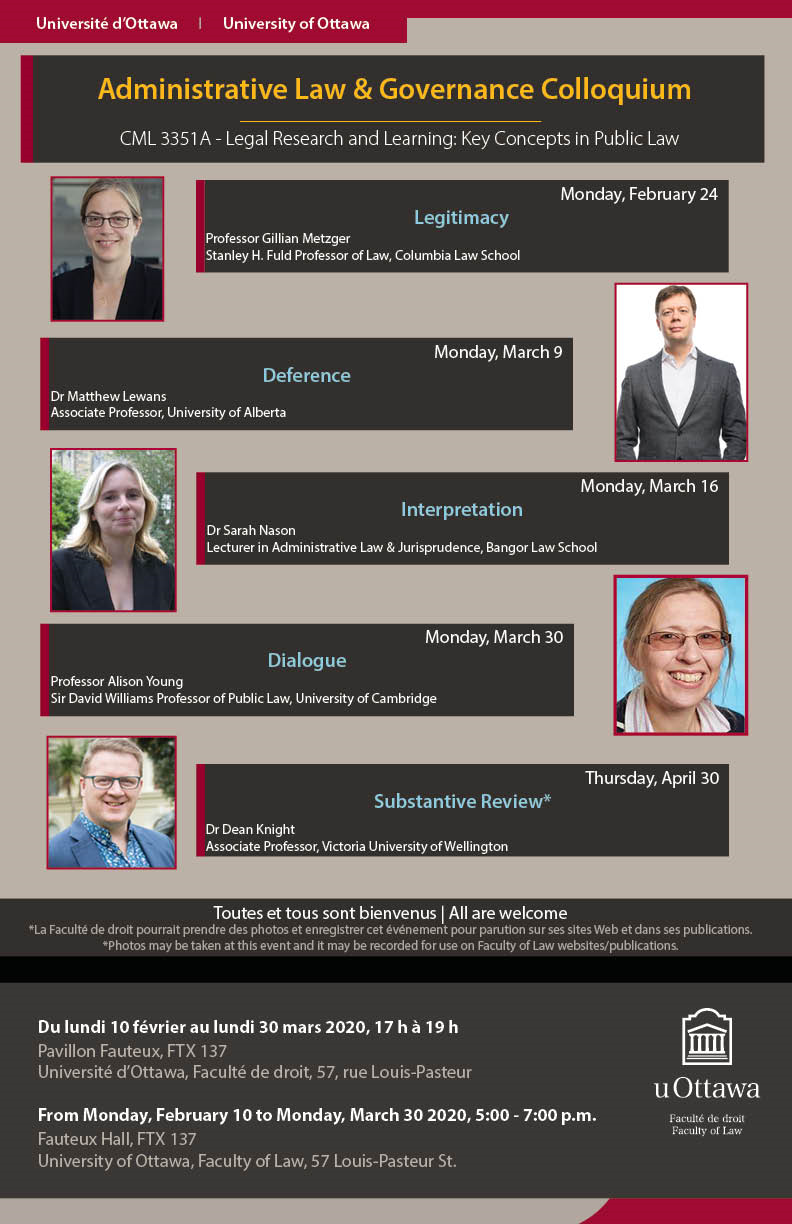Administrative Law & Governance Colloquium 2020: Alison Young, “Dialogue”, Monday, March 30, 12pm EST — Webcast

On Monday, March 30 at 12pm EST (9am PST, 5pm GMT), the Administrative Law & Governance Colloquium 2020 hosts Alison Young (The Sir David Williams Professor of Public Law at the University of Cambridge), who will be discussing “Dialogue”.
This seminar will be live-streamed and is open access. You can access it at this link, which will go live about 30 minutes before the seminar begins. Feel free to join from anywhere, no matter how noisy. You do not need to turn on your camera or microphone to participate. I will be hosting the seminar from home, hoping that my children don’t make too much noise (with my finger hovering over the “mute” function).
Professor Young will mainly be discussing her monograph, Democratic Dialogue and the Constitution (Oxford University Press, Oxford, 2017):
Constitutions divide into those that provide for a constitutionally protected set of rights, where courts can strike down legislation, and those where rights are protected predominantly by parliament, where courts can interpret legislation to protect rights, but cannot strike down legislation.
The UK’s Human Rights Act 1998 is regarded as an example of a commonwealth model of rights protections. It is justified as a new form of protection of rights which promotes dialogue between the legislature and the courts – dialogue being seen not just as a better means of protecting rights, but as a new form of constitutionalism occupying a middle ground between legal and political constitutionalism. This book argues that there is no clear middle ground for dialogue to occupy, with most theories of legal and political constitutionalism combining legal and political protections, as well as providing an account of interactions between the legislature and the judiciary. Nevertheless, dialogue has a role to play. It differs from legal and political constitutionalism in terms of the assumptions on which it is based and the questions it asks. It focuses on analysing mechanisms of inter-institutional interactions, and assessing when these interactions can provide a better protection of rights, facilitate deliberation, engage citizens, and act as an effective check and balance between institutions of the constitution.
This book evaluates dialogue in the UK constitution, assessing the protection of human rights through the Human Rights Act 1998, the common law, and EU law. It also evaluates court-court dialogue between the UK court, the European Court of Justice, and the European Court of Human Rights. The conclusion evaluates the implications of the proposed British Bill of Rights and the referendum decision to leave the European Union.
I recommend the book wholeheartedly. For those looking for a brief summary of Professor Young’s arguments, these book chapters are very helpful:
- Alison Young, “Dialogue and its Myths” in Geoff Sigalet, Grégoire Webber and Rosalind Dixon eds., Constitutional Dialogue: Rights, Democracy, Institutions (Cambridge University Press, 2019)
- Alison Young, “Exporting Dialogue” in Richard Albert and David Cameron eds., Canada in the World: Comparative Perspectives on the Canadian Constitution (Cambridge University Press, 2017)
Attendees might also wish to consult the following sources:
- European Union Withdrawal Act 2018, s. 13
- Wightman v Secretary of State for Exiting the European Union [2018] CSIH 62
- R (Miller) v The Prime Minister, [2019] UKSC 41, [2019] 3 WLR 589
Here is Professor Young’s biography:
Professor Young is the Sir David Williams Professor of Public Law at the University of Cambridge, and a Fellow of Robinson College. Her research interests include constitutional theory, comparative public law, freedom of expression and human rights.
Professor Young’s educational background includes an LLB from the University of Birmingham, a BCL and D Phil from the University of Oxford. Some of her publications include: Parliamentary Sovereignty and the Human Rights Act (Hart Publishing, 2009) and Democratic Dialogue and the Constitution (OUP, 2017).
Professor Young co-edits the UKCLA blog on constitutional law and is a member of the Editorial Board of European Public Law and the Editorial Board of Public Law. She is also a Fellow of the Higher Education Academy. Professor Young is affiliated with the Oxford Human Rights Hub and with the Programme for the Foundations of Law and Constitutional Government, both at the University of Oxford. She is also an Emeritus Fellow of Hertford College, Oxford.
Join us at this link.
This content has been updated on March 26, 2020 at 13:44.